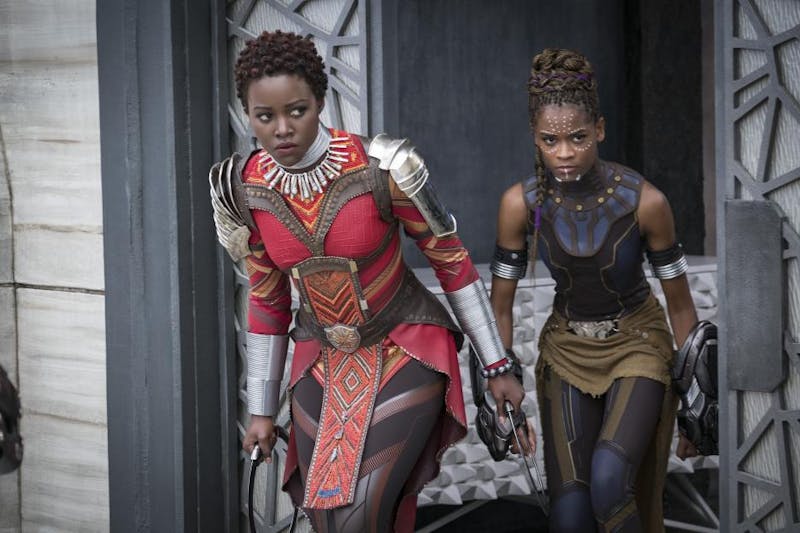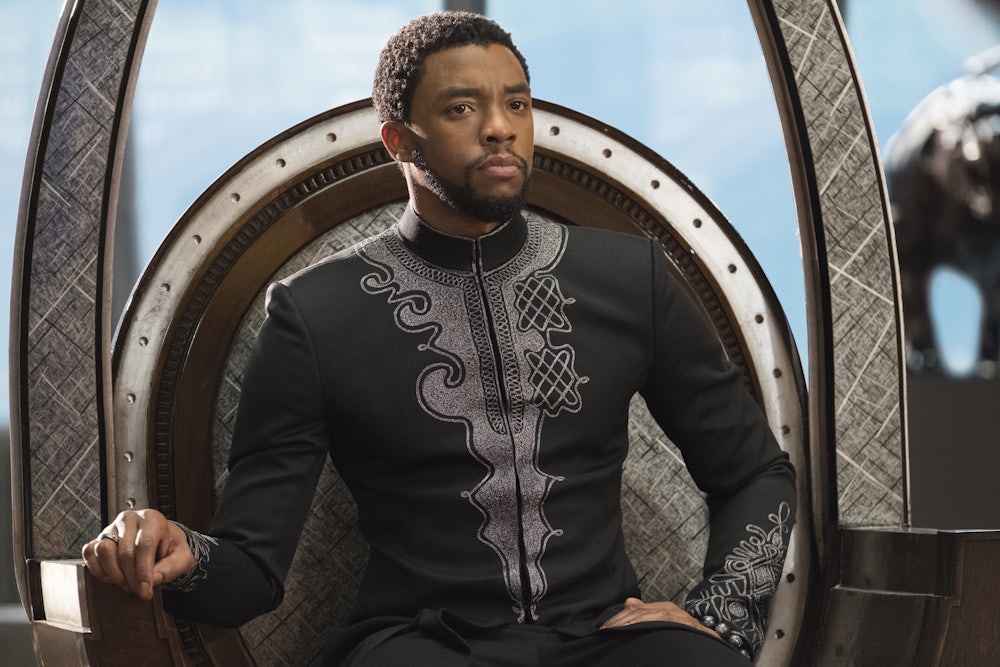In 1952, the psychoanalyst and revolutionary Frantz Fanon observed that in comic books, “the Wolf, the Devil, the Evil Spirit, the Bad Man, the Savage are always symbolized by Negroes or Indians.” Things have changed since then, though not as thoroughly as some would like. Black Panther is Marvel Studios’ eighteenth film and its first to feature a non-white male lead. But while this movie, like the seventeen that preceded it, takes places in the Marvel Cinematic Universe, Black Panther truly operates in a world apart. The bulk of the movie takes place in Wakanda, a fictional Central African monarchy that is secretly the richest and most technologically advanced nation on earth. Wakanda owes its stability to the wise stewardship of the Black Panthers, for centuries the hereditary rulers of the nation, and its wealth to vibranium, a mysterious element used in the construction of both advanced maglev trains and sonic cannons.
Wakanda makes for a fascinating tableau, one realized in vivid detail by director and co-screenwriter Ryan Coogler and Academy Award–nominated cinematographer Rachel Morrison. This idyllic society successfully marries scientific innovation with tribal traditions and an egalitarian ethos—during periods of royal succession, a leader from each of Wakanda’s five ethnic groups may challenge the heir presumptive for the throne. T’Challa, played with dignified restraint by Chadwick Boseman, has recently ascended to the throne following the death of his father T’Chaka, only to find his reign challenged by foes (Michael B. Jordan’s smoldering Eric Killmonger and Andy Serkis’s manic Ulysses Klaue) and friends (Lupita Nyong’o’s radiant Nakia and Daniel Kaluuya’s brooding man at arms W’Kabi) alike.
Between epic set pieces and panoramic vistas Black Panther engages with the pan-Africanist theories that ultimately compelled Fanon to take up arms, joining the Algerian Liberation Front in 1955. During this time, Fanon treated Algerians tortured by the French, and came to believe that colonized peoples had the right to pursue their liberation by any means necessary. But Wakanda has never been colonized, and so interacts with the outside world with a quiet assurance that belies its supposed lack of development. Thus, Coogler’s film draws an explicit distinction between T’Challa’s acceptance of his mandate to maintain Wakanda’s isolationism, and Killmonger’s desire to disseminate Wakandan weapons to dispossessed people of African descent throughout the world, in order to foment a revolution from below.
Killmonger, the orphaned son of an expatriate
Wakandan, grew up in poverty in the United States, his life shaped by the
privation of the American inner-city and his experiences inside the U.S. war
machine. He both desires to locate a home, a place he truly belongs, and yearns
to correct at the point of a gun the injustices of a world order that so often
exploits people of African descent. Jordan expertly communicates these conflicting
motivations, tapping into the same angst and longing that lent pathos and an
unusual depth to his portrayals of Wallace in The Wire and Oscar Grant in Coogler’s debut film, Fruitvale Station. In one scene, he has
a bristling exchange with a curator at a British museum that holds dozens of expropriated
African artifacts, his mocking inquiries into the provenance of each finely
wrought mask communicating a sense of injustice that stretches back centuries
and across the Atlantic.
A child of both privilege and lineage, T’Challa takes the long view, cognizant of the fact that technologies derived from vibranium could potentially disrupt the global balance of power. Killmonger welcomes this chaos, and looks forward to the day when “the sun will never set on the Wakandan empire.” This incongruous boast reminds us that the achievements of historical figures like Winston Churchill—currently enjoying a bit of a renaissance in the popular imagination thanks to The Crown and Darkest Hour—resonate differently in the provinces where his military often ruthlessly enforced colonial rule. The film repeatedly suggests that had Wakanda not hidden its advancements from the outside world, they would have faced a similar invasion from Western powers long ago.
Killmonger understands this history—he’s a former Special Forces operative trained by the CIA to destabilize governments—and he simply wants to turn the tables. T’Challa’s advocacy of internal development and neutrality in international affairs resembles ideas initially advanced by the African-American clergyman Alexander Crummell in the nineteenth century and refined by Ghana’s Kwame Nkrumah in the twentieth, while Killmonger’s desire for a militaristic engagement with the world on African terms seems an interesting blend of Edward Blyden’s messianic Ethiopianism, Fanon’s embrace of armed conflict, and Marcus Garvey’s belief that Africa was a sleeping giant with the unrealized capacity to dominate the world.
The tension between these two visions, along
with T’Challa’s moment of hubris, throws Wakanda into crisis. The way forward comes
from a different source: Nakia, T’Challa’s once and future love. An advocate for
a more measured engagement with the outside world—the film introduces her as
she liberates a group of women from the clutches of a paramilitary outfit that
seems a clear analogue to Boko Haram—she pushes T’Challa to use Wakanda’s
resources to make life better for vulnerable populations in Africa and beyond. Nakia
insists that Wakanda can engage with the world without losing its soul.

She and the other women in the film, Dani Gurira’s dutiful general Okoye, Letitia Wright’s exuberant scientist Shuri (who steals every scene she’s in), and Angela Basset’s regal Ramonda, offer a fascinating counterpoint to the testosterone-fueled rivalry between T’Challa and Killmonger. My only complaint is that the movie didn’t sufficiently explore the complicated relationships that bind and bond these women. As it is, Nakia’s approach recalls the new generation of female activists rising in Africa, like the Nobel Peace Laureate Leymah Gbowee, who has promoted the cultivation of soft power to diffuse war. I never thought I’d see a serious consideration of these ideas in a Disney blockbuster, but Coogler expertly draws upon these distinctive threads of Pan-Africanist thought throughout Black Panther. This is a movie whose political theory matches its stunning special effects.
It’s also a visually inventive film that expertly balances lighthearted fun (you’ve probably never laughed at the word “colonizer,” but you will here) with the tragedy of existential loss both personal and intergenerational to breathe new life into the superhero movie. During the Black Arts movement of the 1960s, figures like Sonia Sanchez and Amiri Baraka lamented a lost connection with the motherland, a relationship fractured by the Middle Passage that leaves both Africans and their descendants in the Americas bereft. Despite Killmonger’s misguided ambition, Black Panther suggests that through acts of imagination and representation, centered around a cosmopolitan and uplifting African narrative, this relationship might be repaired. Fanon would be proud.
